The Up and the Down.
Steve Earle and the Ghost of Hank Williams: I’ll Never Get Out of This World Alive
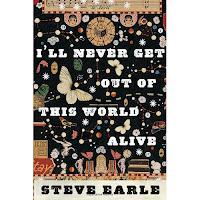 Musician Steve Earle made a solo name for himself with "Guitar Town" and "Copperhead Road" after playing in legendary country and bluegrass bands as a young prodigy. He was nominated for a Grammy, his reputations soared, he added rock and roll to his range—until 1991, when Earle put out the aptly named live album, Shut Up and Die Like An Aviator. Shortly thereafter, he was dropped by his record label for long-standing drug problems, and landed in prison with a heavy sentence for possession of heroin….
Musician Steve Earle made a solo name for himself with "Guitar Town" and "Copperhead Road" after playing in legendary country and bluegrass bands as a young prodigy. He was nominated for a Grammy, his reputations soared, he added rock and roll to his range—until 1991, when Earle put out the aptly named live album, Shut Up and Die Like An Aviator. Shortly thereafter, he was dropped by his record label for long-standing drug problems, and landed in prison with a heavy sentence for possession of heroin….When Did I Become the Junkie Auntie Mame? Courtney Love tells her tangled tale in a new e-book.
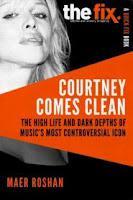 Maer Roshan, author of Courtney Comes Clean: The High Life and Dark Depths of Music’s Most Controversial Icon, logged a dozen “exhilarating and exhausting” sessions with the widow of Nirvana’s Kurt Cobain over the course of a year, pulling together a definitive look at Love’s drug addictions and other demons. Roshan taped countless hours of interviews, and received additional written material from the “Tolstoy of texting,” as Love refers to herself. The book is highly readable, almost, one is tempted to say, addictively so. Sure, it’s tabloid stuff—let he or she who has never peeked at Gawker or Jezebel cast the first stone….
Maer Roshan, author of Courtney Comes Clean: The High Life and Dark Depths of Music’s Most Controversial Icon, logged a dozen “exhilarating and exhausting” sessions with the widow of Nirvana’s Kurt Cobain over the course of a year, pulling together a definitive look at Love’s drug addictions and other demons. Roshan taped countless hours of interviews, and received additional written material from the “Tolstoy of texting,” as Love refers to herself. The book is highly readable, almost, one is tempted to say, addictively so. Sure, it’s tabloid stuff—let he or she who has never peeked at Gawker or Jezebel cast the first stone….Mike Doughty Talks About The Book of Drugs: Former Soul Coughing front man on sobriety and life as a solo artist.
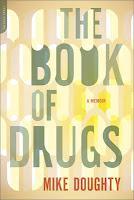 Over the phone, Mike Doughty doesn’t have much to say about his former band, Soul Coughing. When I mention it, he gives out a low growl as a warning. He said it all in The Book of Drugs, and it doesn’t sound like he had much fun. Although the avant-garde rock band created music that was spiky and sneaky and immensely popular, topped off by Doughty’s monotonic but strangely penetrating vocal delivery on such classics as “Super Bon Bon,” “True Dreams of Wichita,” and “Circles,” Doughty was drug-dependent and miserable….
Over the phone, Mike Doughty doesn’t have much to say about his former band, Soul Coughing. When I mention it, he gives out a low growl as a warning. He said it all in The Book of Drugs, and it doesn’t sound like he had much fun. Although the avant-garde rock band created music that was spiky and sneaky and immensely popular, topped off by Doughty’s monotonic but strangely penetrating vocal delivery on such classics as “Super Bon Bon,” “True Dreams of Wichita,” and “Circles,” Doughty was drug-dependent and miserable….Writers On The Edge: A compendium of tough prose and poetry about addiction
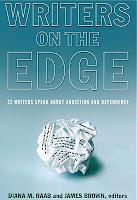 Here’s a book I’m delighted to promote unabashedly. I even wrote a jacket blurb for it. I called it an “honest, unflinching book about addiction from a tough group of talented writers. These hard-hitters know whereof they speak, and the language in which they speak can be shocking to the uninitiated—naked prose and poetry about potentially fatal cravings the flesh is heir to—drugs, booze, cutting, overeating, depression, suicide. Not everybody makes it through. Writers On The Edge is about dependency, and the toll it takes, on the guilty and the innocent alike.”
Here’s a book I’m delighted to promote unabashedly. I even wrote a jacket blurb for it. I called it an “honest, unflinching book about addiction from a tough group of talented writers. These hard-hitters know whereof they speak, and the language in which they speak can be shocking to the uninitiated—naked prose and poetry about potentially fatal cravings the flesh is heir to—drugs, booze, cutting, overeating, depression, suicide. Not everybody makes it through. Writers On The Edge is about dependency, and the toll it takes, on the guilty and the innocent alike.” Book Review of Drunken Angel: A hipster gets his shit straight—sort of.
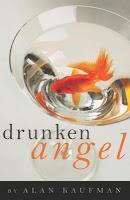 Addiction memoirs remain one of the most popular forms of autobiography on the shelves. But now, when considering a new addition to the genre, it’s impossible not to wonder whether the claims being made by the author are genuine. Since serious drunks often end up visiting the lower circles of hell during the course of their disease, hair-raising and improbable scenes are lamentably common—that is part of the genre’s charm, if that is the right word for it. But how are we to react now? The answer is, you can’t know, and you never really could, that bastard James Frey notwithstanding....
Addiction memoirs remain one of the most popular forms of autobiography on the shelves. But now, when considering a new addition to the genre, it’s impossible not to wonder whether the claims being made by the author are genuine. Since serious drunks often end up visiting the lower circles of hell during the course of their disease, hair-raising and improbable scenes are lamentably common—that is part of the genre’s charm, if that is the right word for it. But how are we to react now? The answer is, you can’t know, and you never really could, that bastard James Frey notwithstanding....Addiction Fiction: Coming-of-Age Drug Novels
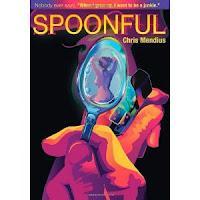 Call it “addiction fiction.” In the past few years we have seen a blossoming of this genre, where the private eye goes to 12-Step meetings, and one day your sponsor may just save your life by gunning down a rival in the street. Or, where the wise-beyond-their-years prep school drug addicts engage in Brett Easton Ellis-style sex and ennui….
Call it “addiction fiction.” In the past few years we have seen a blossoming of this genre, where the private eye goes to 12-Step meetings, and one day your sponsor may just save your life by gunning down a rival in the street. Or, where the wise-beyond-their-years prep school drug addicts engage in Brett Easton Ellis-style sex and ennui….Addiction Noir: The Next Right Thing
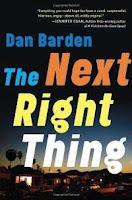 To date, I’ve only reviewed one novel here at Addiction Inbox—Steve Earle’s I’ll Never Get Out of This World Alive, featuring the ghost of Hank Williams standing in for the addictive pleasures that musicians are heir to. Now comes The Next Right Thing by Dan Barden, an exemplar of a new literary genre I am going to call addiction noir….
To date, I’ve only reviewed one novel here at Addiction Inbox—Steve Earle’s I’ll Never Get Out of This World Alive, featuring the ghost of Hank Williams standing in for the addictive pleasures that musicians are heir to. Now comes The Next Right Thing by Dan Barden, an exemplar of a new literary genre I am going to call addiction noir….John Berryman and the Poetry of “Irresistible Descent”: The penal colony’s prime scribe
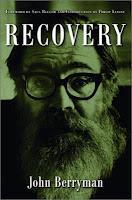 A year before he committed suicide by jumping off a Minneapolis bridge in 1972, Pulitzer Prize-winning poet John Berryman had been in alcohol rehab three times, and had published a rambling, curious, unfinished book about his treatment experiences. Recovery is a time capsule. If you think we have little to offer addicts by way of treatment these days, consider the picture in the 60s and 70s. In Recovery, treatment consists almost entirely of Freudian group analysis, and while there is regular talk of alcoholism as a disease, AA style, there is no evidence that it was actually dealt with in this way, after detoxification....
A year before he committed suicide by jumping off a Minneapolis bridge in 1972, Pulitzer Prize-winning poet John Berryman had been in alcohol rehab three times, and had published a rambling, curious, unfinished book about his treatment experiences. Recovery is a time capsule. If you think we have little to offer addicts by way of treatment these days, consider the picture in the 60s and 70s. In Recovery, treatment consists almost entirely of Freudian group analysis, and while there is regular talk of alcoholism as a disease, AA style, there is no evidence that it was actually dealt with in this way, after detoxification....

